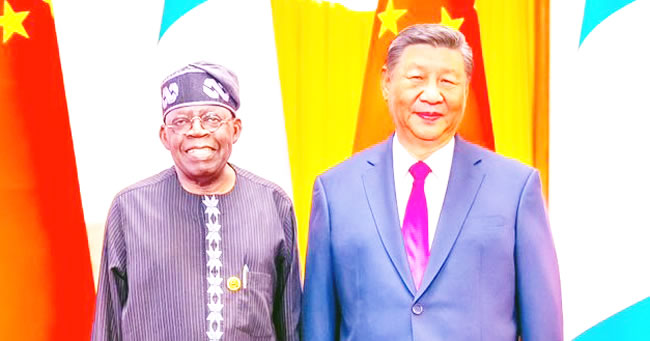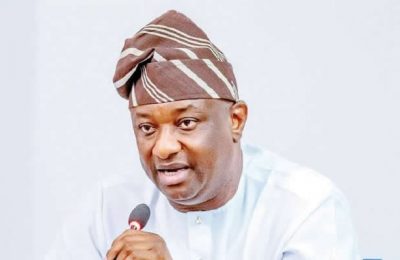In this piece, Abuja Bureau Chief, LEON USIGBE, analyzes President Bola Tinubu’s recent visit to China and its significance on the strategic partnership craved by both Nigeria and the Asian country.
President Bola Tinubu’s recent visit to China for the 2024 Forum on China-Africa Cooperation (FOCAC) marks a significant milestone in Nigeria-China relations. This high-level engagement underscores the strategic importance of the relationship between the two nations and highlights the benefits that both countries stand to gain through deeper collaboration. Tinubu’s visit, combined with his role as Chairman of ECOWAS, has reinforced Nigeria’s commitment to multilateralism, economic development, and regional stability, while positioning China as a key player in Africa’s future.
During the FOCAC meeting, Tinubu called on global leaders to embrace multilateralism as a way to address global challenges, from food insecurity to armed conflicts. This approach aligns with both Nigeria and China’s long-standing commitment to global peace and security, as evidenced by their collaboration on various international platforms like the United Nations, BRICS, and G20.

His focus on multilateralism also underscores Nigeria’s role as a regional leader within ECOWAS, especially in stabilizing West Africa through conflict resolution and peacekeeping. The shared vision for global governance reform, particularly at the UN Security Council, reflects both countries’ desire for a more equitable international order. China’s support for Nigeria’s leadership in this regard positions the West African nation as a crucial actor in shaping global policy, especially within the Global South.
The Nigeria-China relationship has evolved into a comprehensive strategic partnership, particularly in the areas of infrastructure, trade, finance, and energy. The $22.6 billion in bilateral trade between the two nations in 2023 is a testament to the robust economic ties, and both countries are optimistic about further expanding this figure in the coming years.
President Tinubu highlighted China’s role in Nigeria’s infrastructural development, particularly in transportation. Projects like the Lagos-Ibadan Railway, which is partially funded by Chinese investment, have been pivotal in connecting key economic hubs in Nigeria. The continuation of this partnership, particularly the expansion of the Ibadan-Abuja-Kano railway, is expected to further enhance connectivity, job creation, and economic growth in the region.
China’s investments in Nigeria’s transport infrastructure exemplify how the Belt and Road Initiative (BRI) benefits African countries. By facilitating the movement of goods and people, these projects create new channels of investment and commerce, thus aligning with Tinubu’s “Renewed Hope” agenda. With China as a partner, analysts say, Nigeria can address its infrastructure deficit, which has long hindered its economic development.

Beyond infrastructure, Nigeria and China are exploring deeper cooperation in sectors such as energy, digital technology, and manufacturing. With Nigeria’s rich natural resources and growing demand for renewable energy solutions, China’s expertise in solar power and smart grids offers a pathway to greater energy security. Both nations are also committed to exploring opportunities in artificial intelligence, network security, and digital economy – critical areas for Nigeria’s future development.
During Tinubu’s visit, Chinese companies like Huawei reaffirmed their commitment to Nigeria’s digital transformation. Huawei’s mobile ICT classroom project, DigiTruck, is set to enhance digital literacy across underserved Nigerian communities, while its support for Nigeria’s National Talent Export Programme (NATEP) aims to position the country as a hub for tech outsourcing in Africa. These initiatives reflect a broader trend of technological collaboration between Nigeria and China, which will not only improve public services but also create jobs for the country’s burgeoning youth population.
The cooperation also extends to agriculture and green development, with both countries exploring ways to modernize Nigeria’s agricultural sector. With China’s experience in sustainable farming practices, Nigeria can boost its agricultural productivity and ensure food security for its rapidly growing population.
Security cooperation is another crucial component of Nigeria-China relations. With Nigeria facing numerous security challenges, including terrorism and political instability, China has offered support to Nigeria in enhancing its defense capabilities. This includes upgrading military equipment, intelligence sharing, and providing assistance in addressing both traditional and non-traditional security threats.
China’s backing of ECOWAS and Nigeria’s efforts in regional peacekeeping further strengthens the strategic relationship. By promoting stability in West Africa, both Nigeria and China are ensuring a conducive environment for sustained economic development and cross-border investments.
In this context, Tinubu’s leadership within ECOWAS is critical. His engagement with China reinforces Nigeria’s role as a regional stabilizer, while also positioning the country as a bridge between Africa and global powers like China. Through multilateral forums such as FOCAC, Nigeria and China are working together to promote peace and security, not only in West Africa but across the continent.
Nigeria’s strategic partnership with China has broader implications for Africa as a whole. As the largest economy in Africa, Nigeria’s deepening ties with China set a precedent for other African nations. Through initiatives like the Belt and Road Initiative and FOCAC, China has become a crucial partner in Africa’s economic and infrastructural development.
The successful implementation of Nigeria-China projects can serve as a model for other African nations looking to leverage Chinese investment for their own development. Tinubu’s leadership in this regard positions Nigeria as a key player in fostering stronger Africa-China relations, which will be essential for addressing the continent’s long-term development challenges.
Tinubu’s visit to China offered profound insights into how Nigeria can leverage certain aspects of China’s development model to foster national growth. In his address to Nigerians living in China, Tinubu highlighted China’s discipline and commitment to national service as exemplary qualities – key factors in China’s development – that Nigeria should emulate. From rigorous adherence to laws to a strong work ethic, discipline has been central to China’s rapid economic transformation. For Nigeria, embracing a similar level of discipline can drive significant progress. This means fostering a culture where citizens, businesses, and government institutions adhere strictly to regulations and ethical standards. The result would be a more stable and predictable environment conducive to both domestic and foreign investment.
President Tinubu emphasized that reflecting a positive image of Nigeria is crucial for gaining international respect and influence. China’s disciplined approach and rapid development have significantly enhanced its global standing. Nigeria can similarly focus on improving its international image through effective diplomacy, showcasing progress, and building strong global partnerships.
President Tinubu’s observations underscore critical lessons that Nigeria can learn from China’s remarkable development journey. By embracing discipline, committing to national service, harnessing diversity, planning for the long term, and reflecting a positive image, Nigeria can pave the way for accelerated growth and greater global respect. Implementing these lessons will not only drive national progress but also enhance Nigeria’s position on the world stage.
Overall, Tinubu’s visit to China signals a new chapter in Nigeria-China relations, one that is characterized by mutual respect, shared interests, and a commitment to sustainable development. As his government embarks on its “Renewed Hope” agenda, its partnership with China offers a crucial avenue for achieving economic revitalization, improved infrastructure, and enhanced security. The elevation of the Nigeria-China relationship to a comprehensive strategic partnership signals a long-term commitment to mutual growth and prosperity.
READ ALSO: Five times Tinubu’s govt has promised to kickstart Port Harcourt refinery







